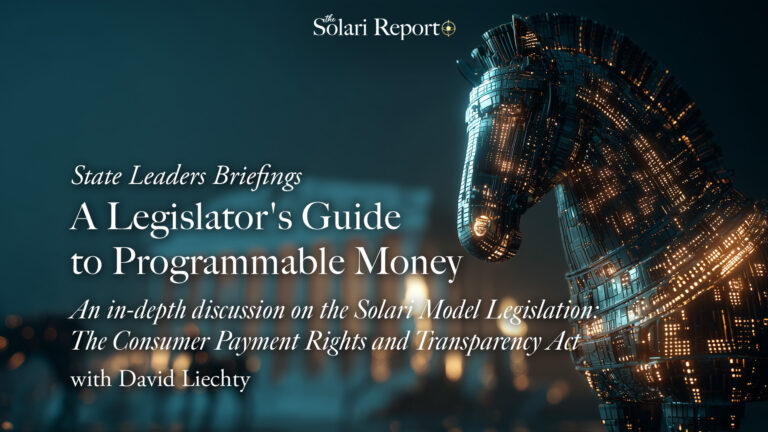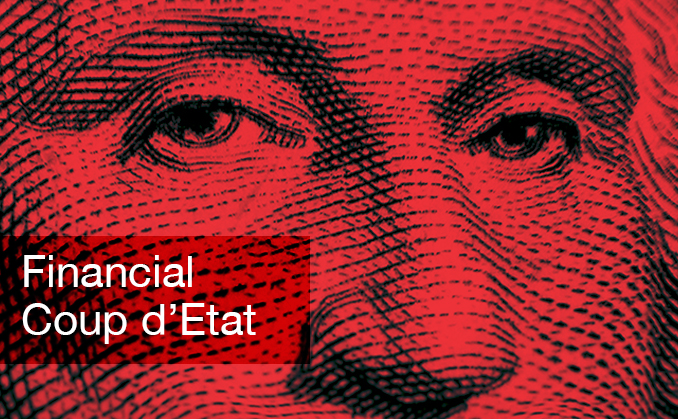In light of recent events, I am republishing.]
By Catherine Austin Fitts
In the fall of 2001 I attended a private investment conference in London to give a paper, The Myth of the Rule of Law or How the Money Works: The Destruction of Hamilton Securities Group.
The presentation documented my experience with a Washington-Wall Street partnership that had:
- Engineered a fraudulent housing and debt bubble;
- Illegally shifted vast amounts of capital out of the U.S.;
- Used “privitization” as a form of piracy – a pretext to move government assets to private investors at below-market prices and then shift private liabilities back to government at no cost to the private liability holder.
Other presenters at the conference included distinguished reporters covering privatization in Eastern Europe and Russia. As the portraits of British ancestors stared down upon us, we listened to story after story of global privatization throughout the 1990s in the Americas, Europe, and Asia.
Slowly, as the pieces fit together, we shared a horrifying epiphany: the banks, corporations and investors acting in each global region were the exact same players. They were a relatively small group that reappeared again and again in Russia, Eastern Europe, and Asia accompanied by the same well-known accounting firms and law firms.
Clearly, there was a global financial coup d’etat underway.
The magnitude of what was happening was overwhelming. In the 1990’s, millions of people in Russia had woken up to find their bank accounts and pension funds simply gone – eradicated by a falling currency or stolen by mobsters who laundered money back into big New York Fed member banks for reinvestment to fuel the debt bubble.
Reports of politicians, government officials, academics, and intelligence agencies facilitating the racketeering and theft were compelling. One lawyer in Russia, living without electricity and growing food to prevent starvation, was quoted as saying, “We are being de-modernized.”
Several years earlier, I listened to three peasant women describe the War on Drugs in their respective countries: Colombia, Peru, and Bolivia. I asked them, “After they sweep you into camps, who gets your land and at what price?” My question opened a magic door. They poured out how the real economics worked on the War on Drugs, including the stealing of land and government contracts to build housing for the people who are displaced.
At one point, suspicious of my understanding of how this game worked, one of the women said, “You say you have never been to our countries, yet you understand exactly how the money works. How is this so?” I replied that I had served as Assistant Secretary of Housing at the US Department of Housing and Urban Development (HUD) in the United States where I oversaw billions of government investment in US communities. Apparently, it worked the same way in their countries as it worked in mine.
I later found out that the government contractor leading the War on Drugs strategy for U.S. aid to Peru, Colombia and Bolivia was the same contractor in charge of knowledge management for HUD enforcement. This Washington-Wall Street game was a global game. The peasant women of Latin America were up against the same financial pirates and business model as the people in South Central Los Angeles, West Philadelphia, Baltimore and the South Bronx.
Later, courageous reporting by several independent investigative reporters confirmed in detail that the privatization and economic warfare model I discussed in London had deep roots in Latin America.
We were experiencing a global “heist”: capital was being sucked out of country after country. The presentation I gave in London revealed a piece of the puzzle that was difficult for the audience to fathom. This was not simply happening in the emerging markets. It was happening in America, too.
I described a meeting that had occurred in April 1997, more than four years before that day in London. I had given a presentation to a distinguished group of U.S. pension fund leaders on the extraordinary opportunity to re-engineer the U.S. federal budget. I presented our estimate that the prior year’s federal investment in the Philadelphia, Pennsylvania area had a negative return on investment.
We presented that it was possible to finance places with private equity and re-engineer the government investment to a positive return and, as a result, generate significant capital gains. Hence, it was possible to use U.S. pension funds to significantly increase retirees’ retirement security by successfully investing in American communities, small business and farms — all in a manner that would reduce debt, improve skills, and create jobs.
The response from the pension fund investors to this analysis was quite positive until the President of the CalPERS pension fund — the largest in the country — said, “You don’t understand. It’s too late. They have given up on the country. They are moving all the money out in the fall [of 1997]. They are moving it to Asia.”
Sure enough, that fall, significant amounts of moneys started leaving the US, including illegally. Over $4 trillion went missing from the US government. No one seemed to notice. Misled into thinking we were in a boom economy by a fraudulent debt bubble engineered with force and intention from the highest levels of the financial system, Americans were engaging in an orgy of consumption that was liquidating the real financial equity we needed urgently to reposition ourselves for the times ahead.
The mood that afternoon in London was quite sober. The question hung in the air, unspoken: once the bubble was over, was the time coming when we, too, would be “de-modernized?”
In 2009 — more than seven years later — this is a question that many of us are asking ourselves.
Part II: Rethinking Diversification
Related Reading:
Dillon, Read & Co. Inc. and the Aristocracy of Stock Profits





















































































































The same guys are stealing the money. First from Russia to NY, then from Europe and USA to where? Where is the missing 4 T dollars? I bet the money is in custody of Israel and being channeled to alternative countries to purchase banks, businesses etc. I’ll tell you what. The guys who study economics are just wasting their time. You can never learn economics unless you have a complicated brain like that of Hebrews. And one more thing. If you cant find to eat bread, EAT SOME CAKE!
“The indication that they are highly satisfied is that they are not only not doing anything to relieve the world situation, but are apparently willing to have it made worse. The privations which are scheduled for it (unless Gentile flabbiness before the Jewish power, high and low, receives a new backbone), will bring the United States to the verge, if not across the very line, of Bolshevism.”
–Henry Ford, 1921
To Yolanda and anyone who wants to know what the end goals are of this small group of people, you need to read “The Singuarity is Near” by Ray Kurzweil. It lays out with a time frame where all of mankind is heading. It involves a future where the labor is performed by artificial intelligence. He can be viewed at youtube giving a talk at the stanford summit on the singularity in 2006. He very briefly lays out most of the book for those who want to get an overview of just what the singularity is and the projected dates for achieving it. His predictions have proven to be precient for over 30 years. The Georgia guidestones also lay out what the endgame is including massive depopulation of this planet. It would seem that there are those in this world that think they are destined to become Gods and that they have been chosen by the God to lord it over those who are not smart enough or talented enough or born to their social level. Aaron Russo also can be viewed at youtube talking about the Rockefellar family and how they are part of this small group.
very good comments,
one think that did click,
the mentioning of people hiding with there *stuff* in gated community’s with bodyguards.
added to the state of the engineered economy and the mercenary scum formally known as “police”.
it just made me think of the film “soylent green” with charlton heston.
celebrating a teaspoon of jam whilst the rich hide in buildings with concrete motes around them!
Tonk Y asked who these groups are….names and backgrounds of those companies and individuals are detailed in two well documented articles found on the web: 1) describes the Russian coup: Collateral Damage: U.S. Covert Operations and the Terrorist Attacks on September 11, 2001; 2) describes the US coup: Collateral Damage (Part 2): The Subprime Crisis and the Terrorist
Attacks on September 11, 2001.
“the end is near” or so the sign of the man on the street corner read 30 years ago. But we all we thinking this guy was talking about god’s return and the end of the world. But now we know what he meant. And it is now the end and it’s too late.
your god will not save you now
good post.
excellent comments by John Merryman, Jason Mutch, Brian, trisha, etc…
humanity’s three biggest problems:
(1) fraudulant money, coupled with usury;
(2) patents; and
(3) copyrights
all three stem from the same abominable human vice – GREED
these in turn are rooted in the original sin – ARROGANCE
have you ever met a greedy bastard who wasn’t arrogant???
most recognize the first as the root source of our problems, so it’s easier to tackle than the second and third which many believe to be vanguards of human ingenuity
Bullshit.
patents and copyrights, like our fraudulent and parasitic money system, are simply two additional ways for greedy arrogant bastards to leach off the labor and lives of the humble masses
no system of servitude is more efficient than that which is self-administered…